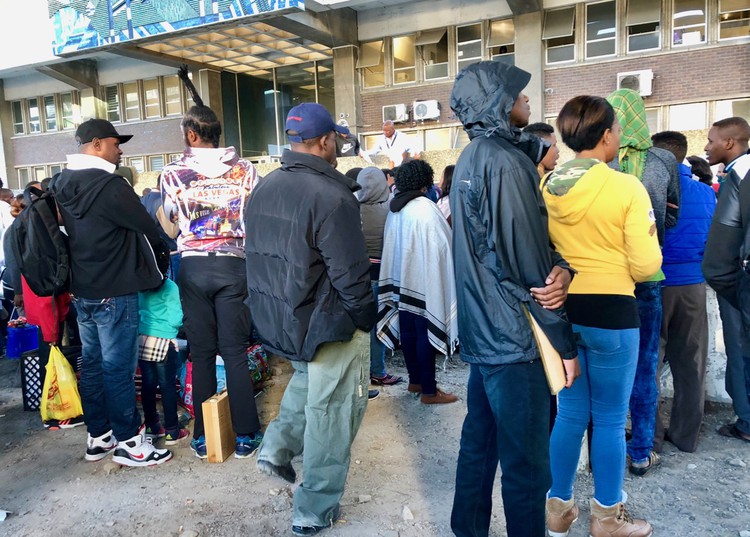
Asylum seekers on Tuesday morning gather outside the Foreshore offices of Home Affairs. Many new applicants were expecting to be processed, but they were turned away despite a court order. Photo: Tariro Washinyira
3 April 2018
It was chaotic outside the Foreshore offices of Home Affairs on Tuesday morning. Security personnel were patrolling the long queues of foreign nationals, many of whom had come to apply for the first time. But security officers told GroundUp that the Foreshore office would not be serving any new asylum seekers.
The Supreme Court of Appeal (SCA) ruled in September that Home Affairs must “reopen and maintain a fully functional refugee reception office in or around the Cape Town Metropolitan Municipality by Friday 31 March 2018.”
But on Tuesday, 3 April, the Foreshore offices turned away new refugee applicants from the DRC, Tanzania, Zimbabwe, Somalia and elsewhere.
Abdul (surname omitted) was one of a group of 20 Somalis applying for asylum for the first time. They had travelled from Atlantis on Monday morning. Abdul arrived in Cape Town in 2015 and has been surviving on piecemeal work. He can’t start a business, open a bank account or go to an educational facility because he does not have asylum papers. He arrived at 5:45am at the Foreshore office. At 8am, an official announced that no newcomers would be processed.
“He did not take down our names or give us appointments. He only said we should come back,” said Abdul. “I am living in fear that police can arrest me at anytime. I am powerless. I didn’t want to argue with the officials and I can’t force them to help me.”
Baku (surname omitted), who is from the DRC, applied for asylum in Johannesburg. He moved to Cape Town in 2015, but the Foreshore offices refused to renew his permit. He is now staying at a church in Goodwood where refugees are provided with blankets and food.
Baku has struggled to get work because he has no valid document. He is now using a letter from the Legal Resources Centre to show police. It reads: “We are advised that asylum seekers whose applications were not originally registered in Cape Town are being turned away by officials at the Cape Town Refugee Reception Office…. Officials insist that asylum seekers return to the office where they first applied for asylum in order to renew their permits. In the meantime any arrest of asylum seekers in the Western Cape by reason of an expired permit might possibly be unlawful and will be premature pending the finalisation of this matter by court.”
Abdikadir Mohamed, Western Cape Director and National Spokesperson Somali Association of South Africa, said, “We are currently consulting with our legal partners but will make an official statement soon.”
At the time of publishing, Home Affairs had not responded to GroundUp’s emails and text messages. In March the Legal Resource Centre accused Home Affairs of defying the court order by not reporting properly to the SCA on its progress towards meeting the April deadline.
On 30 January, Home Affairs had told GroundUp a new refugee office for Cape Town was on the way. Department of Home Affairs spokesperson David Hlabane said, “The Department of Home Affairs has written to the Department of Public Works to get a suitable building for the refugees’ office to give effect to the court order and to ensure that all the needs of refugees and asylum seekers are properly met.”